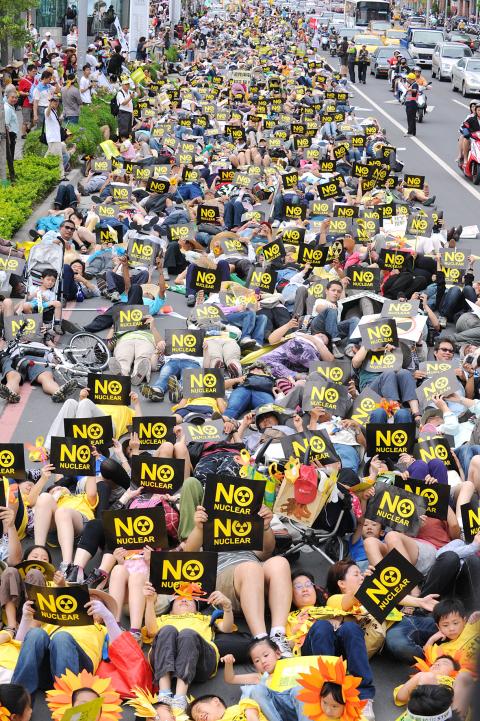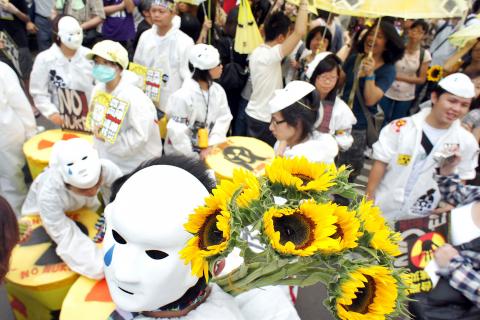Holding yellow banners and clutching sunflowers, thousands took to the streets in Taipei yesterday as part of a nationwide “430 Sunflower No Nuke Action” protest, urging the government to stop construction of the Fourth Nuclear Plant in Gongliao District (貢寮), New Taipei City (新北市), and pursue a more sustainable energy policy.
With “smile at the sun, keep away from nuclear disasters” as the theme of the parade, yellow flowers were picked to symbolize sustainability. Some also held handmade paper windmills, symbolizing green energy and a bright future without the fear of a potential nuclear crisis.
The nation’s anti-nuclear movement gained new momentum in the middle of March after a massive earthquake struck Japan and unleashed a tsunami that damaged the Fukushima Dai-ichi nuclear power plant, causing radiation to be released, which has endangered northeastern Japan’s food and water supplies.

Photo: Huang Chih-yuan, Taipei Times
The disaster resonated especially strongly in Taiwan because, like Japan, it is prone to earthquakes that could lead to scenarios similar to those that crippled the Japanese plant.
People of all ages took part in the carnival-like parade yesterday.
A section of the parade, called the “Keep Away from Nuclear Disaster Division,” was led by about 20 people holding up a long yellow banner with the words “No Nukes” written on it, followed by a group of protesters wearing radiation protection suits to remind people about the potential severity of nuclear disasters.

Photo: CNA
Another section was -comprised mostly of students from several universities.
Young people dressed in colorful clothes danced to music as they shouted anti--nuclear power slogans and paraded through the bustling streets.
“I think the government should replace nuclear power with other safer energy sources,” said a mother surnamed Chang (張), who stood on the sidewalk with other parents and children for a short break during the parade.
She said she wanted her daughter, who is in the first grade, to take part in the parade because they had been taught about nuclear power issues at school, and her daughter was happy to participate.
A student from an Aboriginal Tao village on Orchid Island (蘭嶼), where a nuclear waste storage facility is located, said the Tao people believed that nuclear radiation, which has no form or color, is like evil spirits and must be banished.
This inspired him to wear a traditional Tao warriors helmet made out of paper to symbolize fighting off evil spirits.
A 35-year-old woman surnamed Chen (陳) was dressed in a wedding gown and said that while the government is concerned about the nation’s low fertility rate, “we don’t want to get married and raise our children in such a dangerous environment.”
“After the Fukushima nuclear crisis, I think there are some things that are non-negotiable,” she added.
At one point, the crowd lay on the ground, pretending to be dead, after a simulated nuclear leakage siren sounded.
The display, called “If that day comes,” symbolized the many people that could die in Taiwan if a nuclear crisis were to unfold, the organizer said.
Appealing to the government to map out retirement plans for the nation’s three operational nuclear power plants, to put an end to the construction of the Fourth Nuclear Power Plant and to create a nuclear-free homeland where everyone can live without fear of a nuclear disaster, the protesters shouted slogans such as, “Cherish life, end nuclear power,” and “I want a nuclear-free homeland.”
Their two-and-a-half-hour parade eventually led them to the Presidential Office on Ketagalan Boulevard.
Two Japanese, Ono Saiko and Oga Ayako, who said they were forced to leave their homes in Fukushima Prefecture because of the nuclear crisis, joined the parade in Taipei and shared their thoughts with the crowd.
“The Fukushima nuclear crisis is still going on in Japan; we are not in the mood to find fault with the cause, but we are facing a problem of how are we to protect our next generation,” Saiko said.
She said that she hopes people in Taiwan can join forces with people in Fukushima and take nuclear problems more seriously.
Oga Ayako said she saw “hope and power” in the protest in Taipei, and hopes that the next time they are in Taiwan it will be a nation free from nuclear threats.
Organizers estimated that at least 5,000 people turned out for the protest in Taipei, but no police figure was immediately available.
Additional reporting by AFP and CNA

ACTION PLAN: Taiwan would expand procurement from the US and encourage more companies to invest in the US to deepen bilateral cooperation, Lai said The government would not impose reciprocal tariffs in retaliation against US levies, President William Lai (賴清德) said yesterday, as he announced five strategies to address the issue, including pledging to increase Taiwanese companies’ investments in the US. Lai has in the past few days met with administrative and national security officials, as well as representatives from various industries, to explore countermeasures after US President Donald Trump on Wednesday last week announced a 32 percent duty on Taiwanese imports. In a video released yesterday evening, Lai said that Taiwan would not retaliate against the US with higher tariffs and Taiwanese companies’ commitments to

Intelligence agents have recorded 510,000 instances of “controversial information” being spread online by the Chinese Communist Party (CCP) so far this year, the National Security Bureau (NSB) said in a report yesterday, as it warned of artificial intelligence (AI) being employed to generate destabilizing misinformation. The bureau submitted a written report to the Legislative Yuan in preparation for National Security Bureau Director-General Tsai Ming-yen’s (蔡明彥) appearance before the Foreign Affairs and National Defense Committee today. The CCP has been using cognitive warfare to divide Taiwanese society by commenting on controversial issues such as Taiwan Semiconductor Manufacturing Co’s (TSMC, 台積電) investments in the

HELPING HAND: The steering committee of the National Stabilization Fund is expected to hold a meeting to discuss how and when to utilize the fund to help buffer the sell-off The TAIEX plunged 2,065.87 points, or 9.7 percent, to close at 19,232.35 yesterday, the highest single-day percentage loss on record, as investors braced for US President Donald Trump’s tariffs after an extended holiday weekend. Amid the pessimistic atmosphere, 945 listed companies led by large-cap stocks — including Taiwan Semiconductor Manufacturing Co (TSMC, 台積電), Hon Hai Precision Industry Co (鴻海精密) and Largan Precision Co (大立光) — fell by the daily maximum of 10 percent at the close, Taiwan Stock Exchange data showed. The number of listed companies ending limit-down set a new record, the exchange said. The TAIEX plunged by daily maxiumu in just

‘COMPREHENSIVE PLAN’: Lin Chia-lung said that the government was ready to talk about a variety of issues, including investment in and purchases from the US The National Stabilization Fund (NSF) yesterday announced that it would step in to staunch stock market losses for the ninth time in the nation’s history. An NSF board meeting, originally scheduled for Monday next week, was moved to yesterday after stocks plummeted in the wake of US President Donald Trump’s announcement of 32 percent tariffs on Taiwan on Wednesday last week. Board members voted to support the stock market with the NT$500 billion (US$15.15 billion) fund, with injections of funds to begin as soon as today. The NSF in 2000 injected NT$120 billion to stabilize stocks, the most ever. The lowest amount it